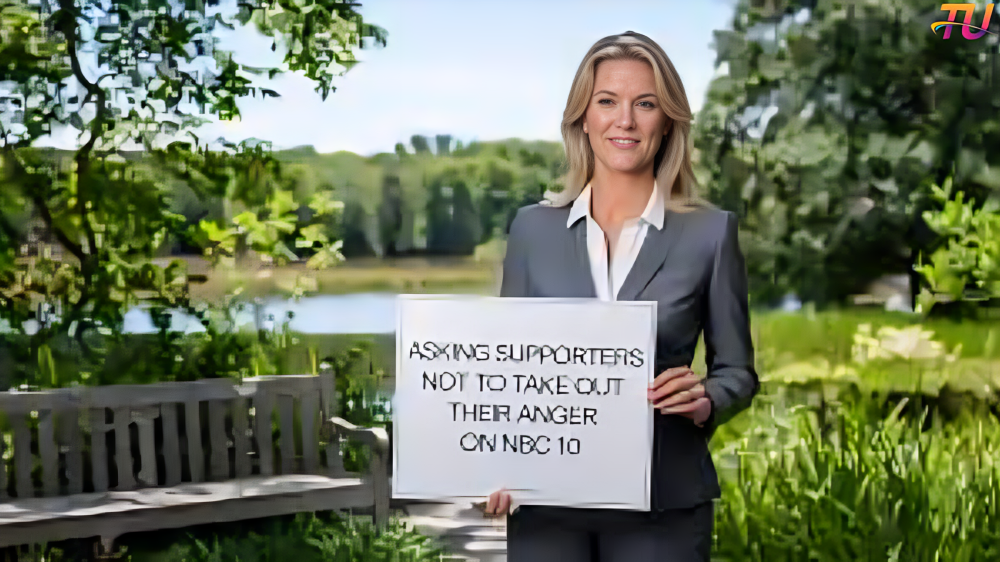Kelly Bates Calls for Respect: No Blame on NBC 10

In the world of journalism, public figures often find themselves caught in difficult situations that spark public outcry. Kelly Bates, a well-known figure in the media, recently asked her supporters not to direct their anger toward NBC 10, a move that has drawn both attention and curiosity. In this article, we will explore the details surrounding this request, examining the key elements that led to Bates’ call for understanding, and the implications it has on the public’s perception of both her and NBC 10.
Background of the Situation: What Led to Kelly Bates’ Request?
Kelly Bates has been a respected member of the NBC 10 news team for several years, known for her professional demeanor and dedication to her work. However, recent events have led to controversy, causing a stir among her loyal supporters. Bates’ call for restraint came after a significant incident that involved the network, stirring emotions among viewers and fans alike.
The issue stemmed from a series of on-air decisions made by NBC 10 that were not well-received by all viewers. With social media platforms serving as a channel for the public to voice their opinions, many took to Twitter, Facebook, and other sites to express their dissatisfaction. Bates, aware of the growing tension, made a public statement urging her followers to refrain from directing their anger at NBC 10 as a whole.
In her statement, Bates emphasized that while she understood the frustrations of her supporters, the responsibility for certain decisions rested with higher-ups at the network, and it was unfair to place blame solely on the shoulders of the on-air talent, including herself. She made it clear that NBC 10 as a company should be held accountable for its actions, not the individual journalists who work tirelessly to present the news.
Why Did Kelly Bates Feel the Need to Speak Out?
Bates’ decision to speak out was likely influenced by several factors. As a respected journalist, she understands the importance of maintaining a professional image and fostering positive relationships with both her audience and her colleagues. However, when public opinion turns negative, it can be challenging to navigate the delicate balance between personal responsibility and corporate accountability.
By asking her supporters not to take out their anger on NBC 10, Bates was attempting to redirect the conversation toward a more constructive dialogue. She wanted to remind her followers that the issues at hand were complex, and that blanket anger toward the network could be detrimental to efforts aimed at achieving meaningful change.
Additionally, Bates likely recognized that the social media landscape has the power to amplify frustration, leading to a disproportionate amount of negativity directed at individuals who have no control over the network’s decisions. As a public figure, Bates felt it was her responsibility to use her platform to mitigate the harm caused by such widespread anger.
The Role of Social Media in Amplifying Controversy
In today’s digital age, social media plays a central role in shaping public perception. It can either serve as a tool for positive change or as a vehicle for the rapid spread of anger and misinformation. The recent controversy surrounding NBC 10 is a perfect example of how social media can escalate a situation, turning a minor issue into a full-blown crisis.
The rise of social media has made it easier than ever for individuals to voice their opinions on matters they care about. In many ways, this democratization of information has allowed for more transparency and accountability within the media industry. However, it also means that the voices of those who feel aggrieved or upset can be amplified, often in ways that are not entirely fair or productive.
When news breaks that an audience or fanbase feels slighted, the reaction on social media can be swift and overwhelming. Negative comments and posts can quickly snowball, and it becomes difficult for those involved to regain control of the narrative. For Bates, this meant that her supporters were expressing their frustration in ways that were not only harmful to her career but also to the broader media landscape.
Bates’ request to her supporters was an attempt to rein in the situation and redirect the anger toward more appropriate channels. It was a call for rationality in a world where emotions often drive online discourse.
What Does This Mean for NBC 10?
For NBC 10, the situation presented a challenge. As a news organization, the network must balance the demands of its audience with the needs of its employees. The controversy created a situation where public opinion about the network’s editorial decisions overshadowed the work of its talented team of journalists, including Bates.
NBC 10, as an organization, must also consider how it handles public criticism, particularly when it involves a beloved on-air personality like Kelly Bates. Networks are often faced with difficult decisions when they are at the center of controversy, and how they respond can have lasting effects on their reputation.
The fact that Bates felt the need to speak out on behalf of the network shows her loyalty to NBC 10, but it also indicates a larger issue at play—one that is becoming increasingly common in the age of social media and instant communication. Networks are under greater scrutiny than ever before, and their decisions are subject to rapid public feedback, making it harder to control the narrative.
Kelly Bates’ Impact on NBC 10’s Brand
As a well-known and trusted journalist, Kelly Bates holds a significant position within the NBC 10 brand. Her professionalism and dedication to her work have helped build her reputation as a reliable news source. However, the public’s reaction to recent events suggests that her relationship with the network is complicated by the broader conversation about media accountability.
Bates’ efforts to manage her public image and that of NBC 10 are important, not only for her career but for the network’s continued success. By speaking out and asking her supporters to refrain from anger toward NBC 10, Bates is working to maintain a sense of integrity and professionalism. She recognizes that the media landscape is constantly evolving, and navigating these shifts requires a delicate approach that considers both personal and corporate responsibilities.
FAQs
1. Why did Kelly Bates ask her supporters not to direct their anger at NBC 10?
Bates requested this because she felt it was unfair for her supporters to direct their anger at the network, as the decisions causing frustration were made by higher-ups and not individual journalists like herself.
2. What caused the controversy surrounding NBC 10?
The controversy stemmed from a series of decisions made by NBC 10 that were not well received by certain segments of its audience. This led to negative reactions on social media.
3. How does social media affect situations like this?
Social media amplifies public reactions, which can escalate issues quickly and result in negative attention toward individuals or organizations that may not be entirely responsible.
4. What impact does Kelly Bates have on NBC 10?
Kelly Bates is a respected journalist with a significant following. Her actions and statements can influence public perception of both herself and the network.
5. What should viewers take away from Kelly Bates’ request?
Viewers should consider the broader context of a situation before directing anger toward individuals or organizations. Understanding the complexities behind decisions can lead to more productive conversations and outcomes.
Conclusion
Kelly Bates’ call for her supporters to avoid directing their anger at NBC 10 is a testament to her commitment to professionalism, as well as a plea for more thoughtful engagement from her audience. In a world where emotions and social media reactions easily influence public sentiment, Bates’ message reminds us that a situation often has more depth than it appears. It is essential to look beyond the surface and consider the broader context before assigning blame or taking action.

0 Comments